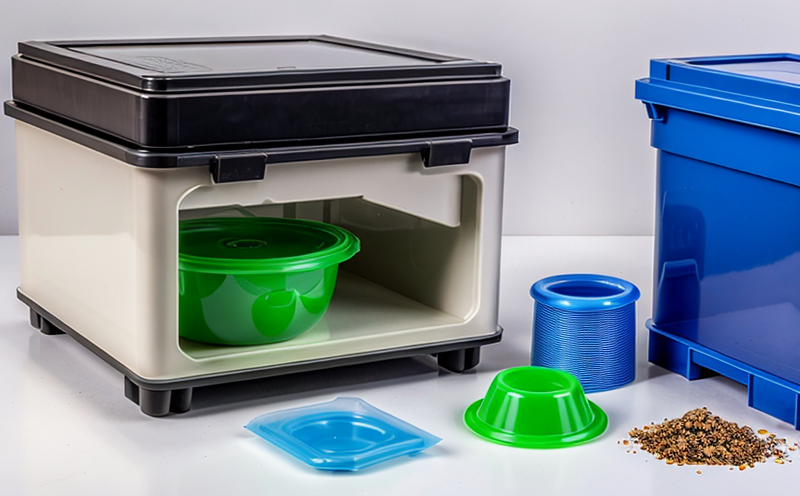EN 1186 Food Contact Plastics Overall Migration Testing
The EN 1186 standard provides a set of requirements and test methods to ensure that plastic materials used in contact with foodstuffs do not migrate harmful substances into the food. This standard is crucial for manufacturers, suppliers, and regulatory bodies ensuring food safety. The overall migration testing under this regulation involves placing the packaging material in contact with a specific solvent or food simulants, then measuring the amount of any potentially hazardous substances that have migrated from the plastic to the food.
The primary focus on EN 1186 is to ensure compliance with European Union regulations regarding materials and articles intended to come into contact with foodstuffs. This includes packaging plastics such as films, containers, trays, and other components used in the food industry. The standard aims to prevent the transfer of harmful substances like plasticizers, stabilizers, or any other additives that could pose a risk to human health.
The testing procedure involves several steps: selecting appropriate test samples, preparing them according to standardized methods, exposing these materials to specific food simulants (such as water, alcohol, oil), and then measuring the migration of substances over time. The test simulates real-life conditions ensuring that any harmful components are detected early in the supply chain.
The results from this testing must adhere strictly to the limits set by EN 1186 for each specific additive or compound. Compliance with these limits is essential because even small amounts of migration can accumulate over time, potentially leading to significant health risks if not adequately controlled. The standard also emphasizes the importance of using appropriate test methods and equipment to achieve accurate results.
To perform this testing accurately, specialized laboratories like Eurolab must adhere strictly to international standards such as EN 1186-2:2017 for films and similar materials; EN 1186-3:2019 for containers; and EN 1186-4:2005 for trays. These standards define the test conditions, duration, and acceptance criteria that must be met to ensure compliance.
The testing process typically involves placing a pre-determined amount of food simulant into contact with the packaging material, sealing it in a suitable container if necessary, and allowing it to stand under controlled conditions (temperature, humidity) for an agreed-upon period. After this incubation phase, the test samples are analyzed using various analytical techniques such as gas chromatography-mass spectrometry (GC-MS), liquid chromatography-tandem mass spectrometry (LC-MS/MS), or Fourier transform infrared spectroscopy (FTIR).
Accurate and reliable results depend on precise sample preparation, correct exposure to the food simulants, and appropriate analytical methods. The challenge lies in ensuring that all components of the packaging material are tested under realistic conditions while maintaining consistency across different batches and suppliers.
Industry Applications
This testing is critical for several industries, particularly those involved directly with food safety. Food manufacturers, beverage producers, and packaging companies rely on EN 1186 testing to ensure their products meet regulatory requirements. For instance, a food manufacturer using plastic trays or films in the packaging process needs to demonstrate that these materials do not transfer any harmful substances into the food.
- Food manufacturers: Ensure compliance with EU regulations for plastic packaging intended for food contact.
- Beverage producers: Verify that all components used in cans, bottles, or other containers comply with safety standards.
- Packaging companies: Validate the integrity and safety of their products during the design and development phases.
Eurolab Advantages
Eurolab offers comprehensive services to assist clients in meeting EN 1186 requirements. Our team of experts provides tailored solutions based on the specific needs of each client, ensuring that all tests are conducted according to international standards.
- State-of-the-art facilities equipped with advanced analytical instruments for precise measurements.
- Experienced scientists and engineers who understand the nuances of EN 1186 testing.
- A commitment to quality assurance throughout every stage of the testing process.
- Comprehensive reporting services providing detailed insights into test results and compliance status.
Competitive Advantage and Market Impact
By adhering to EN 1186 standards, companies can gain a competitive edge in the market. Compliance with this standard not only ensures safety but also builds consumer trust. Consumers are increasingly concerned about food safety and the materials used in packaging. Businesses that demonstrate their commitment to these high standards will be more likely to attract customers seeking safe products.
- Enhanced reputation among consumers who value health and safety.
- Potential for increased market share as a result of positive public perception.
- Avoidance of legal issues associated with non-compliance, saving on potential costs and reputational damage.





